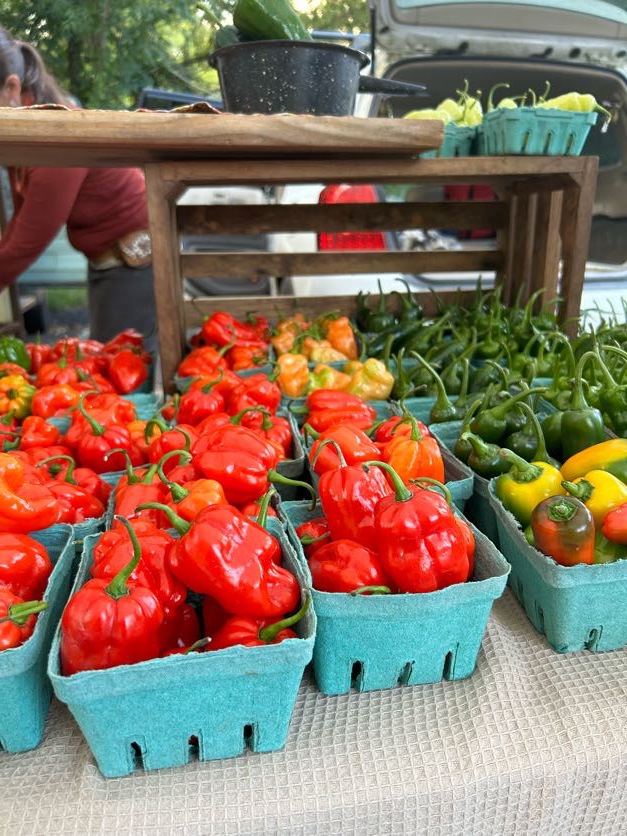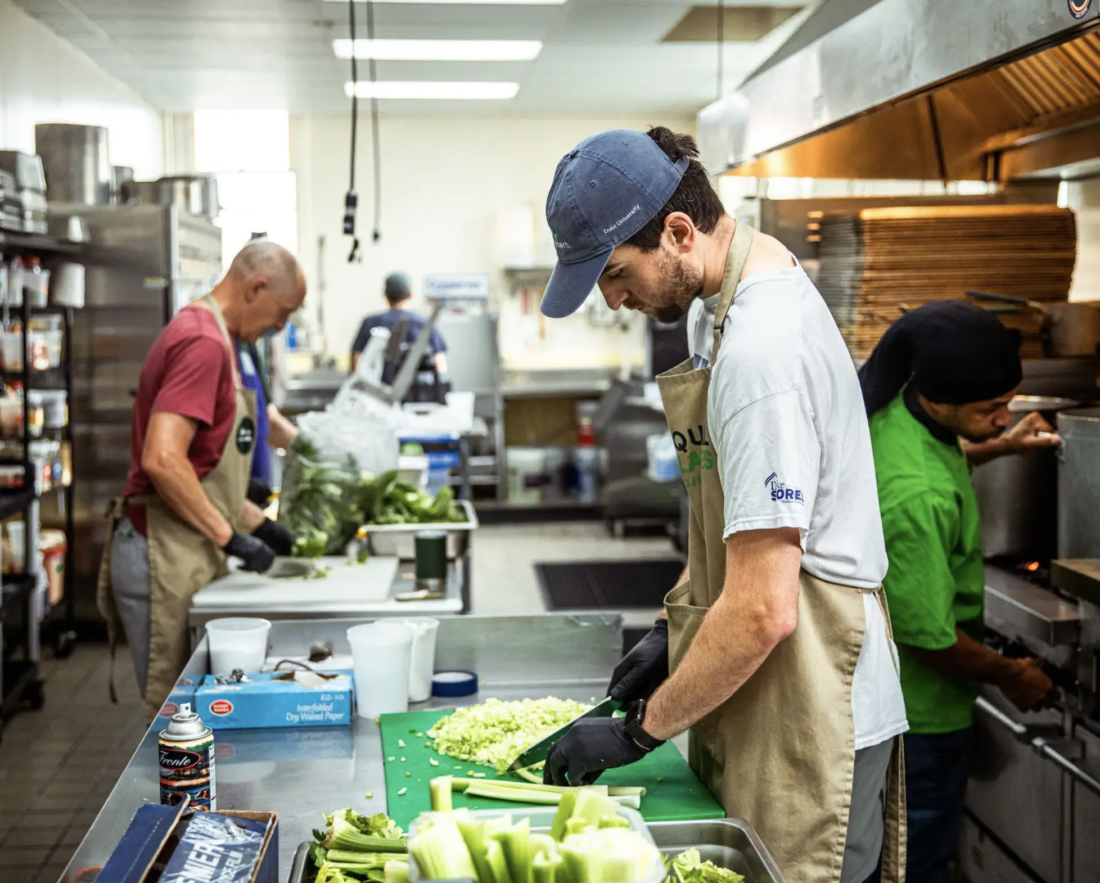From demolished greenhouses to washed-out fields, Western North Carolina growers were hit hard by Tropical Storm Helene and have been struggling to tread water ever since. Among the disaster’s many impacts on the area’s agriculture operations has been the shuttering of local restaurants.
For many farms, the decimation of this crucial market base during what should have been a booming fall leaf season has portended a possible death knell for their businesses during the lean winter months. But in the face of this challenge, WNC food distribution nonprofits have worked to offer growers an economic lifeboat.
Bolstered by experience gained and initiatives put in place during the COVID-19 era, several organizations have quickly stepped in to replace lost income streams for WNC farmers.
“Many food distribution nonprofits — as well as chefs powered by nonprofits and/or individual donations — have been able to increase local purchasing during the crisis, which helps make up some of the market outlet loss due to restaurant closures,” says Sarah Hart, communications director at the Appalachian Sustainable Agriculture Project (ASAP), an Asheville nonprofit that helps connect WNC farmers to market options.
Many area anti-hunger organizations already relied on local food purchasing and had relationships with farmers before Helene, Hart continues. But their budgets have increased with crisis funding and donations in the wake of the disaster, allowing them to initiate new or expand existing farm-to-client programs.
With the 2020 launch of its Appalachian Farms Feeding Families program, ASAP was in the vanguard of local organizations that stepped up during the COVID-19 lockdowns to support farmers by buying their products to share with underresourced community members. “It’s amazing to see how seeds of this [post-Helene] community-driven response, in some cases, go back to the COVID crisis,” Hart says.
‘Overdrive’
The WNC nonprofits with the largest budgets for buying from local farmers during the Helene crisis, Hart points out, have been Yancey County-based TRACTOR Food & Farms, Foothills Food Hub in Marion and Haywood Christian Ministry (HCM) in Waynesville. One thing these groups have in common, she explains, is that they all work at the intersection of food and health by implementing fresh fruit and vegetable prescription programs funded by the Medicaid-supported Healthy Opportunities Pilot (HOP).
Having partnered with ASAP’s Farms Feeding Families program during the pandemic, HCM has had a long-term goal of eventually developing into a food hub — an organization that manages the aggregation, storage, distribution and marketing of locally grown foods. Over the past year or so, HCM had dabbled in limited ways with a couple of farm-sourcing pilot projects, including a small community-supported agriculture (CSA) program.
But Helene fast-tracked those initiatives and added new ones, says Nicole Hinebaugh, director of the Farms and Food Project for HCM. “We had to basically create this local food procurement system, kind of from scratch,” she says. “It kicked our plans into overdrive in a really, really significant way. We have already worked with at least 33 different farms since the storm.”
When Hinebaugh spoke with Xpress in early November, HCM had already spent around $75,000 in the wake of Helene to pay the market rate to its farm partners — purchasing more than 34,000 pounds of fresh food. Those provisions were distributed to Haywood County residents through HCM’s on-site pantry and its network of about 30 community partners, including numerous churches and community centers that moved into a food distribution role in the aftermath of the disaster.
In addition to funding from HOP, Hinebaugh says, generous donations from individuals and businesses along with some disaster relief grants have enabled HCM to replace farmers’ lost income streams by paying market price for their products.
“Continuing to have an outlet available that is paying market rate is a big deal; it’s really, really helpful for a lot of farmers,” she says. “We’ve been really happy to be able to pay farmers what they want to be paid for their food.”
The organization is looking for more sustainable funding sources to maintain and expand its fresh-food efforts in the long term. One goal is to find a larger facility to house HCM’s rapidly growing fresh-food programs. Another objective is to establish contract relationships with farm partners so they can plan their growing seasons.
“We will pay a significant portion of the contract right up front, almost like a CSA, so they have those dollars in place for early-season investments, cash flow, then a guaranteed market space that we’ve already agreed on together,” Hinebaugh explains.
Small but mighty
Even nonprofits with smaller budgets have been able to make a big impact in supporting local farms to feed the community in the wake of Helene, says ASAP’s Hart. One example she points to, the Asheville-based Equal Plates Project, is another HOP partner that emerged during the COVID-19 pandemic as We Give a Share. From its outset, the initiative had the dual mission of providing a market to farmers while battling food insecurity.
Equal Plates’ model from the beginning, says executive director Madi Holtzman, has been to buy fresh food — from meat and eggs to cornmeal, apples and vegetables — from WNC producers, then enlist chefs in the nonprofit’s two kitchen facilities to turn these items into hot meals that are distributed at no cost to residents in need through partner organizations serving specific communities.
Before Helene, Equal Plates was cooking around 1,000 meals a week for its distribution partners, Holtzman says. But following the storm, with the support of significantly increased donations, Equal Plates’ production has ramped up to about 1,000 meals per day — which translates to more financial stability for its roughly 20 local producer partners.

“We essentially tripled our meal production overnight,” says Holtzman. “It made us look around at each other as an organization and say, ‘Hey, wow, we can do this! We can do more meals in our two kitchens than we thought we could.’ And we would like to sustain this level of production.”
Rather than going wider with its support of farmers, though, Holtzman says, Equal Plates intends to invest more deeply in its existing farm partners. “Our aspiration as we grow is to become a genuinely meaningful account for them, so working with Equal Plates actually matters for their bottom line.”
Bounty & Soul, a food- and wellness-focused nonprofit in Black Mountain, is another small but mighty organization that ASAP’s Hart points to as a key group supporting WNC farmers post-Helene. To supply its weekly, free food distribution events, founder Ali Casparian has maintained relationships with local farmers since she started the organization in 2014. But Bounty & Soul also leaned heavily into donations from MANNA FoodBank, which lost its entire office and warehouse facility in flooding from Helene.
Since the storm, Casparian says, Bounty & Soul has tripled its buying from local sources. Now 90%-95% of the fresh food it distributes at its 13 sites in Buncombe and Henderson counties — up to 20 tons a week — comes from local and regional farms and producers.
Additionally, Bounty & Soul is supporting farmers by providing information on educational opportunities and resources available within the community to help the agriculture sector with storm recovery. “We are committed to this because our food system has just been rocked in every way,” says Casparian. “This is one way to be part of rebuilding that piece of it.”
Digging out, giving back
Haywood Christian Ministry’s commitment to local farms included staff members driving around the county in the first couple of days after the floods to do wellness checks with the farm partners it had at the time. Among those on its list were Sara Martin and Dustin Cornelison, co-owners of Sustainabillies, a 3-acre vegetable-growing operation in Canton. A landslide knocked out one of the farm’s high-tunnel greenhouses and buried about half of its growing space — including fields full of fall and winter vegetables and all of its mature blueberry bushes.
Amid the devastation, Martin recalls the joy of seeing HCM staff driving up to the farm the Sunday after the storm. “It was so amazing,” she says. “We had all this produce we had harvested in preparation for the [Haywood’s Historic Farmers] Market on Saturday, and we didn’t have power … so, we were like, ‘Oh, no, all this is going to go bad.’”
Martin says she and Cornelison tried to donate the produce to HCM to distribute to people in need, but the staff members insisted on paying them full market value for it. “It was really powerful for us because we missed the next two farmers markets because we just weren’t able to make it, just trying to put our lives back together.”
With the farm as the sole source of income, Martin says being able to rely on HCM as a market while she and Cornelison figure out how to recover and rebuild their business is a blessing. “It’s a really scary situation to be in, and they’re really helping all of us, all the farmers locally who are just trying to scratch together what we can right now,” she says. “Having the ministry there letting us know they’re going to help us get through it, it’s pretty amazing.”
She adds that as a person who has long supported food justice advocacy, partnering with a nonprofit that’s helping feed the community nourishes her spirit. “I love the fact that they’re getting our food to people who really need it.”
Wendy Brugh of Dry Ridge Farm in Madison County shares the same sentiment. Dry Ridge relies on sales of its pastured eggs, with 80% of its business being wholesale to area restaurants and grocers. In the wake of Helene, with restaurants closed, the farm pivoted to selling its eggs to nonprofits such as the Woodfin YMCA, TRACTOR in Yancey County and Equal Plates.
Additionally, with the support of funds raised by individuals and businesses such as The Farm Connection plant nursery in Marshall, Brugh has been able to donate eggs to nonprofits including Southside Community Farm and to community storm recovery efforts in Marshall.
“Organizations that are focused on food distribution have been instrumental in keeping our business sustainable and in making me feel like I have a way to contribute,” Brugh says. “Providing the ability to help while also not taking away from my ability to pay employees has been pretty huge.”




Before you comment
The comments section is here to provide a platform for civil dialogue on the issues we face together as a local community. Xpress is committed to offering this platform for all voices, but when the tone of the discussion gets nasty or strays off topic, we believe many people choose not to participate. Xpress editors are determined to moderate comments to ensure a constructive interchange is maintained. All comments judged not to be in keeping with the spirit of civil discourse will be removed and repeat violators will be banned. See here for our terms of service. Thank you for being part of this effort to promote respectful discussion.